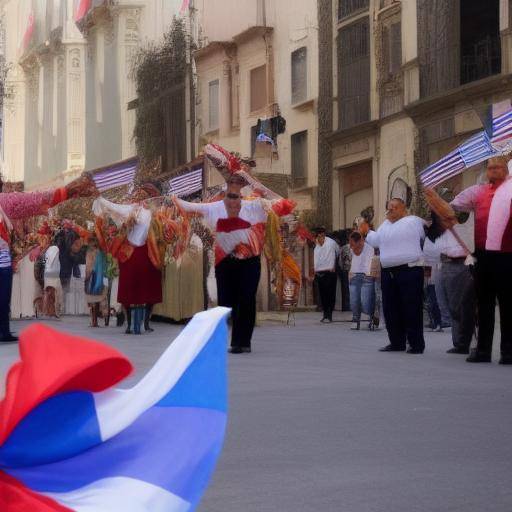
Thanksgiving is one of the most important traditional parties in the United States. This celebration, which has deep historical roots, is an occasion when families gather to thank for the blessings received during the year. In this article, we will explore in detail the history, meaning, and traditions associated with Thanksgiving in the United States, as well as their comparison with traditional parties in this country. We will also examine the impact of this celebration on society and its relevance today.
History and Background
The history of Thanksgiving in the United States dates back to the European settlers who arrived in North America in the seventeenth century. These settlers, known as the Pilgrims, celebrated a feast to thank the first harvest in the New World. In 1621, they shared a banquet with Native Americans to celebrate the good harvest, which is considered the origin of Thanksgiving.
Over time, Thanksgiving became a national holiday, and in 1863, President Abraham Lincoln declared it an official day of celebration. Since then, it has become a tradition rooted in American culture, marked by parades, large family meals and sporting events.
Deep analysis
Thanksgiving presents important benefits to American society, as it promotes family union, promotes gratitude and solidarity, and strengthens cultural identity. However, it also faces contemporary challenges, such as excessive marketing and criticism for its impact on the history of Native Americans.
Today, Thanksgiving is a reflection of the cultural diversity of the United States, as families celebrate the festive in different ways, incorporating culinary traditions and rituals characteristic of their ethnic origins.
Comprehensive review
The holiday is celebrated with a traditional dinner including turkey, mashed potatoes, cranberry sauce and pumpkin pie. Over the years, these meals have acquired a symbolic meaning of gratitude and family union. However, the holiday has also evolved to include more contemporary aspects, such as Black Friday, which marks the start of the Christmas shopping season.
Excessive marketing has generated criticism regarding the prioritization of consumption above the original meaning of the holiday. However, many communities and organizations use Thanksgiving as an opportunity for charity and solidarity, focusing on helping those in a vulnerable situation.
Comparative analysis
Compared to Thanksgiving with traditional parties in the United States, we can perceive similarities in terms of cultural meanings and associated values. Traditional holidays often reflect the unique identity of each community, but they share the importance of reflection, gratitude and solidarity, which connects them with the spirit of Thanksgiving.
Practical Tips and Accessible Tips:
- Promote participation in community events focused on solidarity and gratitude.
- Incorporate culinary traditions and rituals characteristic of the culture of origin to enrich the celebration of Thanksgiving.
- To promote awareness of the original meaning of the festival and its historical relevance.
- Find opportunities to contribute to the community through philanthropic and volunteer activities.
Ideas of Experts and Industry Reviews
According to experts in cultural anthropology, Thanksgiving represents a phenomenon that symbolizes the fusion of cultural traditions in American history. Despite the criticisms, some scholars consider that the festivity remains an opportunity for reflection and gratitude, regardless of its contemporary evolution.
Case Studies and Practical Applications
Many cases of communities using Thanksgiving have been documented as a platform for promoting solidarity and mutual support. For example, non-profit organizations organize community dinners for those who do not have a home or resources to celebrate the holiday for themselves. These initiatives highlight the potential of the festival to enrich community relations and promote empathy.
Future Trends and Predictions
Thanksgiving is expected to continue to evolve to reflect the cultural diversity of American society. As social awareness of the historical impact of the festival grows, renewed efforts are likely to emerge to highlight the original traditions of thanks and solidarity, offering a balance between the traditional and the contemporary.
Conclusion
Thanksgiving in the United States is a festive rooted in the history and culture of the country. Despite current challenges and criticism, it remains a significant occasion for family union, reflection and gratitude. Its evolution reflects the dynamics and diversity of American society, and its impact continues to transcend cultural barriers.
FAQs
Why is Thanksgiving celebrated in the United States?
Thanksgiving is celebrated to thank the blessings received during the year, and it goes back to the European settlers who arrived in North America in the seventeenth century.
What is the meaning of the traditional Thanksgiving banquet?
The traditional Thanksgiving banquet, which includes turkey, mashed potatoes, cranberry sauce and pumpkin pie, symbolizes gratitude and family union.
How has Thanksgiving evolved over the years?
Thanksgiving has evolved to incorporate more contemporary aspects, such as Black Friday, which has generated criticisms related to the excessive marketing of the holiday.
What is the importance of Thanksgiving for the cultural identity of the United States?
Thanksgiving is essential for the cultural identity of the United States, as it reflects cultural diversity and promotes family union and solidarity.
What opportunities exist to enrich the celebration of Thanksgiving?
The celebrations of Thanksgiving can be enriched by incorporating culinary traditions and rituals that belong to the culture of origin, and by participating in community events focused on solidarity.
What are the predictions about the future of Thanksgiving in the United States?
Thanksgiving is expected to continue to evolve to reflect the cultural diversity of American society, balancing original traditions with contemporary aspects.
With this, it is clear that Thanksgiving in the United States is much more than a holiday: it is an expression of traditions, values and cultural evolution that continues to resonate in contemporary society.
